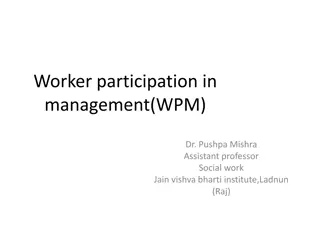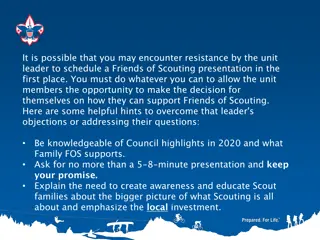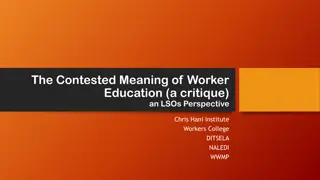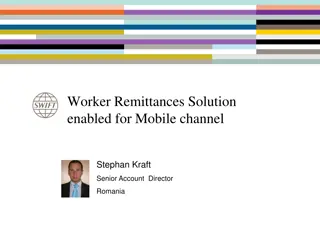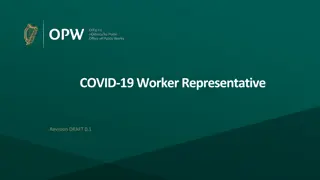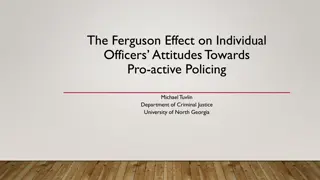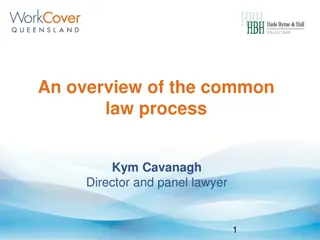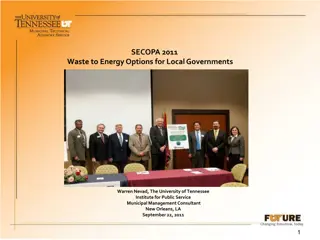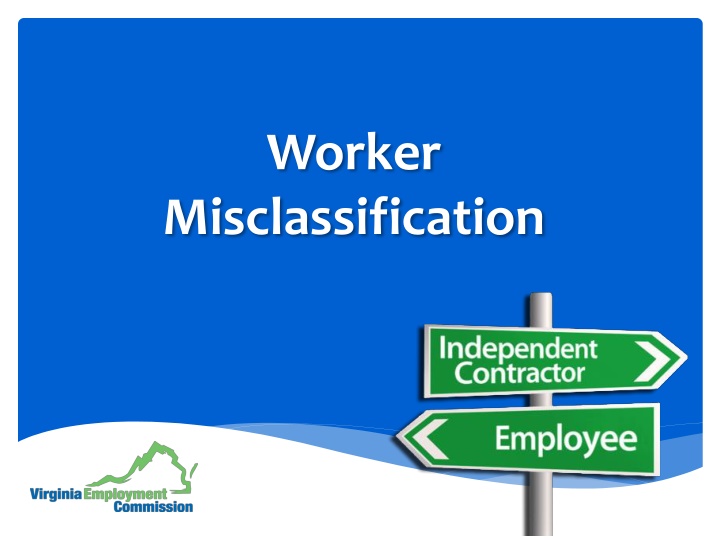
Understanding Worker Misclassification and Virginia Laws
Learn about worker misclassification, the impact it can have, and Virginia laws surrounding this issue. Discover the difference between an employee and an independent contractor, as well as statutory exclusions from employment in various industries.
Download Presentation

Please find below an Image/Link to download the presentation.
The content on the website is provided AS IS for your information and personal use only. It may not be sold, licensed, or shared on other websites without obtaining consent from the author. If you encounter any issues during the download, it is possible that the publisher has removed the file from their server.
You are allowed to download the files provided on this website for personal or commercial use, subject to the condition that they are used lawfully. All files are the property of their respective owners.
The content on the website is provided AS IS for your information and personal use only. It may not be sold, licensed, or shared on other websites without obtaining consent from the author.
E N D
Presentation Transcript
Worker Misclassification
Agenda Define misclassification Impact of misclassification Virginia laws regarding misclassification Task Force
What is Worker Misclassification? Treatment by an employing unit of a worker as an independent contractor (or sub-contractor) when the worker is in fact an employee.
Worker Person who performs work in exchange for remuneration (pay) Can be an employee or an independent contractor
Employing Unit (EU) The business that assigns work to a worker in exchange for payment Does not include a consumer
Employee Subject to direction and control of EU EU determines when / where / how work is performed EU provides tools & materials Is not working in capacity of a business owner/operator Usually paid by time (hourly, weekly, or yearly salary)
Independent Contractor Not subject to direction and control of EU (but EU may set quality standards and deadlines) Owns/operates business Licensing Insurance Usually paid a piece or job rate Usually provides tools/materials Should have a written contract
Employee or Independent Contractor? Some statutory exclusions from employment: truck owner-operators and lessees some agricultural labor some domestic employment fishing & crabbing work performed for spouse, son/daughter, or parent (if worker<21) college students working for their school interns and student nurses commission-based insurance agents, realtors, and gasoline distributors (wholesale)
Employee or Independent Contractor? Statutory exclusions from employment (cont d): work/study programs at public or non-profit colleges human services contracted by a commonwealth, city or county human services agency sales personnel who are commissioned based and have a contract newspaper delivery personnel who are commissioned based and have a contract taxi and sedan drivers courier drivers
Employee or Independent Contractor? Statutory exclusions from employment (cont d): college students working at camps court reporters cosmetologists (including manicurists) and barbers psychiatrists, therapists, and LCSW s working under contract prison work (by inmates)
Employee or Independent Contractor? Aside from previous exceptions, legal presumption is employee. Presumption is rebuttable Burden is on the employing unit. Standard of proof: preponderance
Employee or Independent Contractor? VEC considers 20 factors ( IRS test ): 1. Instructions (when, where, how) 2. Training 3. Integration 4. Services rendered personally 5. Hiring/supervising/paying assistants 6. Continuing relationship 7. Set hours of work 8. Full time required 9. Work done on premises 10. Order/sequence set
Employee or Independent Contractor? VEC considers 20 factors ( IRS test ) cont d: 11. Reports 12. Payment by hour/week/month 13. Payment of expenses 14. Furnishing of tools/materials 15. Significant investment in facilities 16. Profit or loss 17. Working for more than one business at a time 18. Making services available to general public 19. Right to fire 20. Right to quit
Treatment of an Independent Contractor (IC) Proper treatment of an independent contractor by an EU includes: Checking licensing before accepting/considering bid Soliciting IC s TIN Not exerting more direction/control than is specified in the contract Making timely payments per schedule specified in contract Providing 1099(s) at end of job or end of year
Treatment of an Employee Proper treatment of an employee by an EU includes: At commencement of employment: I-9 W-4 Court-ordered support Virginia New Hire Compliance with Virginia and U.S. minimum wage and overtime rules
Treatment of an Employee Employee included with Worker s Compensation policy (accurate description of number and types of employees provided to carrier) Wages reported to VEC for unemployment insurance coverage Payroll withholdings FICA (Social Security and Medicare) State income tax Federal income tax W-2 in January
In Fact What matters most is what is really happening The existence of a W-9, a contract, and a 1099 are indicative but not dispositive. An EU can t convert an employee into an independent contractor by filling out some forms.
Why Does it Matter? Misclassification harms: Workers Law-abiding businesses (competitors) Taxpayers
Applicable Virginia Laws Virginia Unemployment Compensation Act (Title 60.2) EU shall report new hires and re-hires to the Virginia New Hire Reporting Center. EU shall request each new hire to disclose child support withholding orders. EU may not require/accept agreement to waive Unemployment Insurance benefits or rights. Violations are Class 1 Misdemeanors (up to 1 year in jail).
Applicable Virginia Laws Fraud Against Taxpayers Act (Title 8.01, Art. 19.1) Presenting a false/fraudulent claim, knowingly making a false statement, or knowingly avoiding an obligation to the Commonwealth is subject to penalty of up to $11,000 plus treble damages.
Applicable Virginia Laws Professions and Occupations (Title 54.1) Contracting or bidding without a license is a Class 1 Misdemeanor. Receiving/considering a bid without first receiving the bidder s license is a Class 1 Misdemeanor. Worker who undertakes work without proper license/certificate commits a Class 1 Misdemeanor and is subject to fine of $500/day.
Applicable Virginia Laws Tax (Title 58.1) EU who fails to withhold/submit required withholdings is subject to civil penalty of 6% per month plus interest. Willful failure is a Class 1 Misdemeanor. DOLI (VOSH) An EU with misclassified workers is not entitled to size / good faith reductions when calculating penalties for safety violations.
Sources of Compliance Reviews Complaints Workers Competitors Referrals from other government agencies Random selections 1099 extract information (coming soon)
Inter-Agency Task Force on Worker Misclassification and Payroll Fraud Established in 2014 Members: Secretary of Commerce and Trade (Chair) Virginia Employment Commission Department of Labor and Industry Worker s Compensation Commission State Corporations Commission Department of Professional and Occupational Licensing Department of Taxation Office of the Attorney General
Partnership with U.S. Department of Labor As of June 16, 2016, Virginia should be shaded blue, having become the 31st state to enter a MOU with USDOL Information sharing Resource sharing Hot button issue for USDOL Sec. Tom Perez Source: https://www.dol.gov/whd/workers/misclassification/
Questions? Comments? Complaints / Referrals? Contact:Virginia Employment Commission Targeted Audit and Investigative Enforcement Unit (804) 371-4218 geoff.garner@vec.virginia.gov


